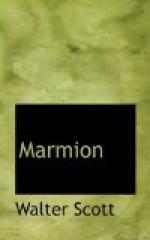lines 40-48. Corslet, a light cuirass protecting the front of the body; brigantine, a jacket quilted with iron (also spelt ’brigandine’); gorget, a metal covering for the throat; mace, a heavy club, plain or spiked, designed to bruise armour.
’Bows and quivers were in vain recommended to the peasantry of Scotland, by repeated statutes; spears and axes seem universally to have been used instead of them. The defensive armour was the plate-jack, hauberk, or brigantine; and their missile weapons crossbows and culverins. All wore swords of excellent temper, according to Patten; and a voluminous handkerchief round their neck, “not for cold, but for cutting.” The mace also was much used in the Scottish army! The old poem on the battle of Flodden mentions a band—
“Who manfully
did meet their foes,
With leaden mauls,
and lances long.”
’When the feudal array of the kingdom was called forth, each man was obliged to appear with forty days’ provision. When this was expended, which took place before the battle of Flodden, the army melted away of course. Almost all the Scottish forces, except a few knights, men-at-arms, and the Border-prickers, who formed excellent light-cavalry, acted upon foot.’—Scott.
Stanza iii. line 48. swarthy, because of the dark leather of which it was constructed.
line 54. See above, Introd. to ii. line 48.
line 56. Cheer, countenance, as below, line 244. Cp. Chaucer, ‘Knightes Tale,’ line 55:—
’The eldeste lady
of hem alle spak
When sche hadde
swowned with a dedly Chere.’
Stanza iv. line 73. slogan, the war-cry. Cp. Aytoun’s ’Burial March of Dundee’:—
‘Sound the fife and cry the slogan.’
line 96. The Euse and the Liddell flow into the Esk. For some miles the Liddell is the boundary between England and Scotland.
line 100. Brown Maudlin, dark or bronzed Magdalene. pied, variegated, as in Shakespeare’s ‘daisies pied.’ kirtle = short skirt, and so applied to a gown or a petticoat.
Stanza V. For unrivalled illustration of what Celtic chiefs and clansmen were, see ‘Waverley’ and ‘Rob Roy.’
lines 130-5 Cp. opening of Chapman’s Homer’s Iliad iii.:—
’The
Trojans would have frayed
The Greeks with
noises, crying out, in coming rudely on
At all parts,
like the cranes that fill with harsh confusion
Of brutish clanges
all the air. ’
Stanza vi. lines 143-157. Cp. Dryden’s ‘Palamon and Arcite,’ iii. 1719-1739:—
’The neighing
of the generous horse was heard,
For battle by
the busy groom prepar’d:
Rustling of harness,
rattling of the shield,
Clattering of
armour furbish’d for the field,’ &c.
line 157. following = feudal retainers.—Scott. To the poet’s explanation Lockhart appends the remark that since Scott thought his note necessary the word has been ’completely adopted into English, and especially into Parliamentary parlance.’




